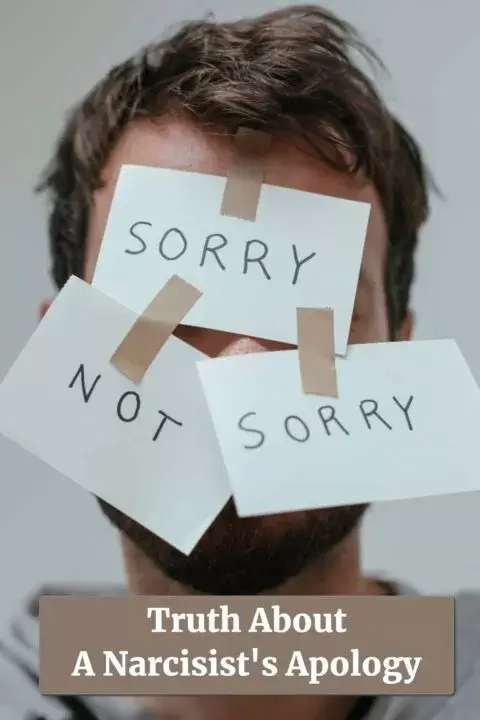— Researched and written by Dr. Sandip Roy.
First, a narcissist can apologize, but it doesn’t come naturally to them. They rarely utter “Sorry.”
But when they do, something seems off. You are never satisfied with the way your narcissist apologizes.
The core features of narcissism, and its clinical diagnosis Narcissistic Personality Disorder (NPD), include grandiosity, a lack of empathy, and a strong need for admiration. Those traits decide the shape of their apologies.
Apologies = regretful acknowledgments of an offense.
A narcissist’s regretful acknowledgments don’t carry any regret. Their “sorriness” is fake, and they have no intention to change their ways.
3 Takeaways:
- A narcissist’s apology is superficial and remorseless. They use it as a strategic tool to manipulate a person or maintain a favorable self-image.
- Their apologies often involve shifting or minimizing blame, with no commitment to change their behavior.
- Such apologies can leave issues unresolved and can lead to unhealthy interactions in personal and professional relationships.
Discover the truth about narcissistic apologies, from psychology.
Table of Contents
Do narcissists ever apologize?
Narcissists can and do apologize, but these are rare, superficial, and unauthentic. Mostly, they apologize to save themselves or defuse the situation, not because they truly feel bad. They cleverly shift the blame onto the person asking for the apology, other people, or situations when they get cornered to say “Sorry”.
Typical Examples of A Narcissist’s Apology
- “Ok, I am sorry. Are you happy now?”
- “I apologize if I offended you, but you are too sensitive.”
- “Sorry for what happened, but it wasn’t entirely my fault.”
- “I’m sorry you feel that way, but I was just telling the truth.”
- “I apologize, you misunderstood me. You didn’t get the joke.”
- “I apologize for any inconvenience, but it really wasn’t a big deal.”
- “I guess I owe you an apology, but you should have known I was joking.”
Selfish Motives Behind A Narcissist’s “Sorry”
A narcissist’s apology is usually for their own benefit. They may apologize to:
- Avoid Negative Consequences: To evade accountability or repercussions for their actions.
- Control A Disputed Situation: To reassert dominance or control in a relationship or situation.
- Quickly Go Past The Incident Without Real Change: To merely de-escalate a conflict without addressing the root of the issue—their behavior.
- Maintain a Favorable Public Image: To preserve their “good” self-image and “faultless” reputation in other people’s eyes.
- Manipulate Other’s Emotions: To influence or sway the other person’s feelings, to regain favor or trust.
- Prevent Losing Important Relationships: To avoid the potential loss of a relationship that they find valuable or beneficial.
- Create An Illusion of Empathy: To give the appearance of understanding and caring, despite a lack of genuine empathy.
- Deflect Further Scrutiny or Criticism: To stop further examination of their behavior or to silence criticism.
These apologies are more about their own feelings, needs, or image — rather than out of a true concern for the hurt person.

Characteristic Patterns of A Narcissist’s Apologies
Narcissistic apologies often involve:
- Insincerity: Phrases like “I didn’t mean to hurt you, but…” or “I’m sorry if you think I was wrong,” hollow out their implicit claim of a sincere apology. They show they don’t really feel sorry for what they did wrong.
- Reluctance To Accept Responsibility: Phrases like “I’m sorry you feel that way” or “I apologize if you say so” show their intention to dodge the blame for their role in causing harm.
- Blame-Shifting: Remarks such as “You’re just as responsible as I am” or “It wouldn’t have happened if you hadn’t…” try to redirect the fault to other people or external circumstances, letting them bypass acknowledging their mistake or misbehavior.
- Making Excuses: Things like “I was just stressed out” or “That’s just how I am” justify their behavior and evade accountability. These are more about deflecting blame or criticism, rather than a heartfelt admission.
- Minimizing The Offense: They use “You’re making a big deal out of nothing” or “It wasn’t all that serious as you’re making it” to downplay the severity of their actions. These imply that the offended person is judging them strictly.
- Manipulation: Statements like “Let’s just forget about it and move on” or “I said I’m sorry, what more do you want?” are to placate or silence the other person, without any true intent to resolve the issue or change behavior.
Superficial Nature of Narcissistic Apologies
Narcissistic apologies are calculated strategies.
You can be almost sure that their “mea culpas” are superficial, and entirely lack any depth or sincerity that heartfelt apologies have.
They rarely say “Sorry” out of a genuine concern for the hurt they caused.
They apologize to serve their self-interests — avoid confrontation, deflect insult, maintain a favorable public image, or manipulate the emotions of others.
Narcissists don’t understand the harm they caused or feel sad about it, so they can’t express words of true regret.
People close to the narcissist gradually realize that asking them to apologize creates a confusing dynamic in the relationship.
“Does he care so little about me that he can’t admit that he hurt me? Is his ego so big that he cannot ask for forgiveness?”
It alienates the victim, who expects a sincere admission from the narcissist.
A Narcissist’s Lack of Empathy
A key trait of narcissism is empathy deficit (a lack of empathy), which unquestionably affects how they apologize. Empathy is the ability to understand another person’s thoughts, feelings, or emotional state.
Their empathy deficit affects their apologies in several ways:
- Superficial Understanding of Harm: Since they cannot truly identify with others’ feelings, narcissists cannot grasp the severity of the hurt their actions caused. So their apologies are emotionally shallow, which doesn’t move the other person.
- Absence of Genuine Remorse: Empathy allows us to feel remorse for our wrongs. The empathy lack in narcissists strips their apologies of genuine regret. Their apology might be mechanically correct, but they are not emotionally hurting.
- Focus on Self over Others: Without empathy, a narcissist’s apologies are more about protecting their ego or image rather than acknowledging and addressing the pain they’ve caused. The apology serves more as a tool to maintain their self-esteem or manipulate the situation to their advantage.
- Inability to Acknowledge The Impact of Actions: Empathy helps us understand the consequences of our actions on others. Narcissists, lacking this, tend to make apologies that do not fully acknowledge or take responsibility for the negative outcomes of their behavior.
- Manipulative Intentions: Their apologies are often a means to an end – often to manipulate, control, get attention, regain favor, or keep the other person engaged in the relationship rather than to heal or elevate the relationship.
The Role of Grandiosity in Narcissistic Apologies
The narcissist’s sense of grandiosity can hinder their ability to offer sincere apologies. They may see admitting fault or expressing remorse as a sign of weakness or a blow to their ego.
As a result, their apologies, if at all offered, could seem arrogant or insincere.
How Relationships Are Affected by A Narcissist’s Apologies
The nature of narcissistic apologies can have a profound impact on personal and professional relationships.
These apologies, often lacking in sincerity and understanding, can lead to unresolved conflicts, emotional distress, and a cycle of dysfunctional interactions.
Understanding this dynamic is crucial for those who interact closely with narcissists.
FAQs
What are the elements of a genuine apology?
A genuine apology is unconditional, and typically includes the following key elements:
1. True Remorse: The person apologizing conveys sincere regret for their actions, that they understand and feel sorry for the hurt or harm caused.
2. Acknowledgment: It identifies the specific wrongdoing, and asks for clarification on what other actions or words caused harm.
3. Taking Responsibility: They accept full responsibility for their actions, without making excuses or shifting blame to others or external circumstances.
4. Commitment to Change: There is a clear promise or assurance to not repeat the behavior, and a willingness to learn and grow from the experience.
5. Request for Forgiveness: A genuine apology seeks forgiveness. Though it indicates a desire to repair the relationship, it doesn’t mean forcing the offended person’s decision to forgive or continue the relationship.
6. Offer to Make Amends: The apology-seeker asks what steps they can take to rectify the harm done or improve the situation, showing their intent to fix things or pay back.What elements make up a narcissist’s apologies?
A narcissist’s apology typically has:
1. Superficial Remorse: A narcissist’s regrets are insincere. They say Sorry without feeling sorry. Their apologies do not carry the intention of understanding the harm caused beyond superficially.
2. Vague or Absent Acknowledgment: Narcissists avoid acknowledging specifically what they did wrong. Their apologies are vague, so they cannot be held accountable or forced to change their ways.
3. Shifting Responsibility: Narcissists pass on the blame to others or circumstances, fully or partially. If they cannot get away, they try to include others to make it a group accountability.
4. No Genuine Commitment to Change: Their “promises to change” lack sincerity. A hallmark of a narcissist’s apology is that there is no real commitment to stop the hurtful behavior.
5. Manipulative Request for Forgiveness: Their asking for forgiveness is more manipulative than genuine, so they can quickly move past the issue without any resolution or change.
6. Lack of Offer to Make Amends: Narcissists typically don’t offer concrete steps to compensate for their actions, nor show any willingness to put effort into healing or rectifying the situation.
Final Words
A narcissist’s apologies are mostly insincere words and self-serving motives. Typically, they are excuses that bounce any responsibility away from themselves.
Try not to believe their apologies easily, as their words are free of genuine regrets and intentions of mending their ways.
Once you understand the nature of their apologies, you can handle narcissistic people better.
√ Also Read:
- 10 Fake Ways Narcissists Apologize (And How To Respond)
- 10 Strange Behaviors Of Narcissists In Relationships
- How To Make A Narcissist Regret Losing You?
√ Please spread the word if you found this helpful.
• Our Story!
